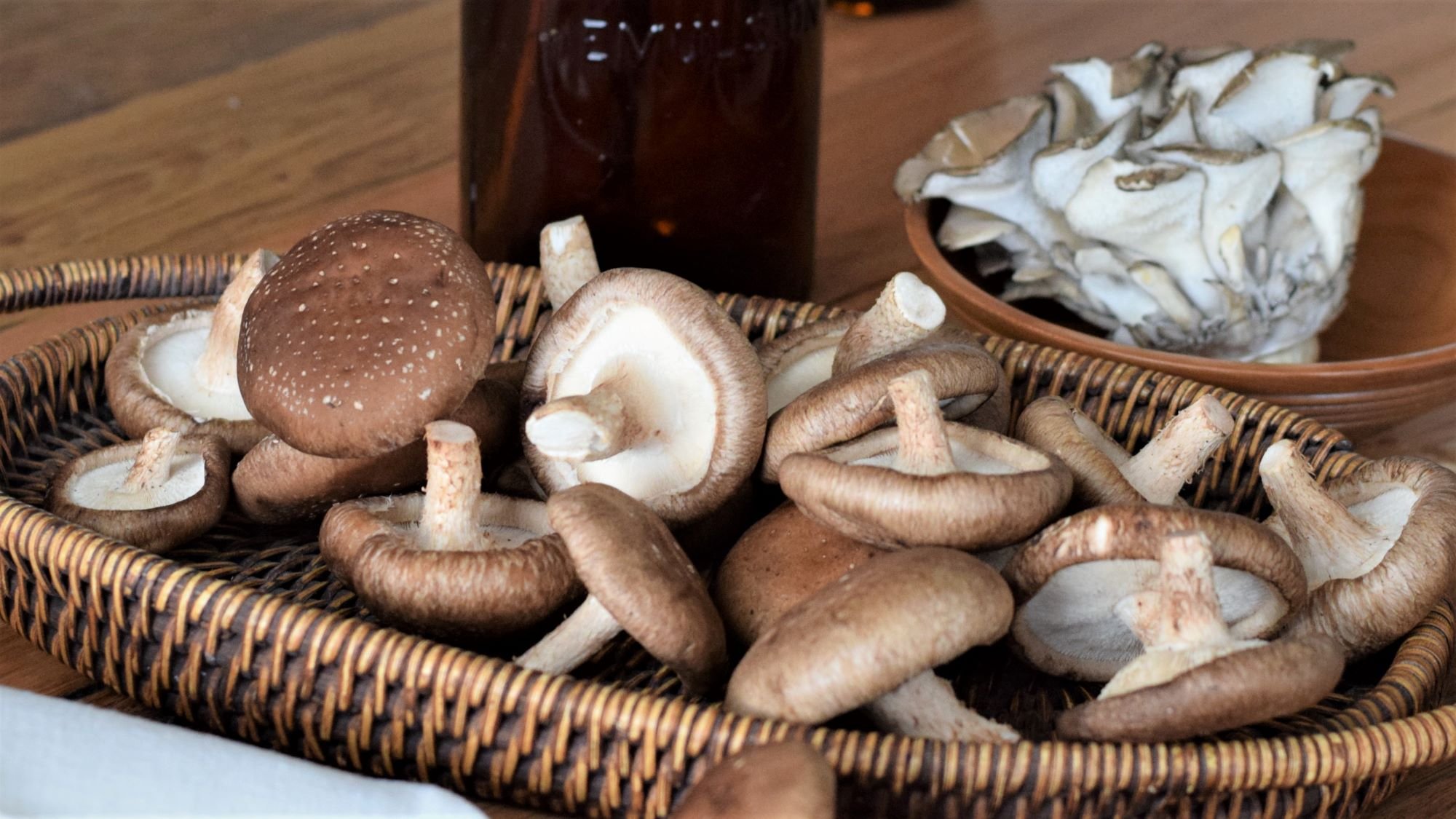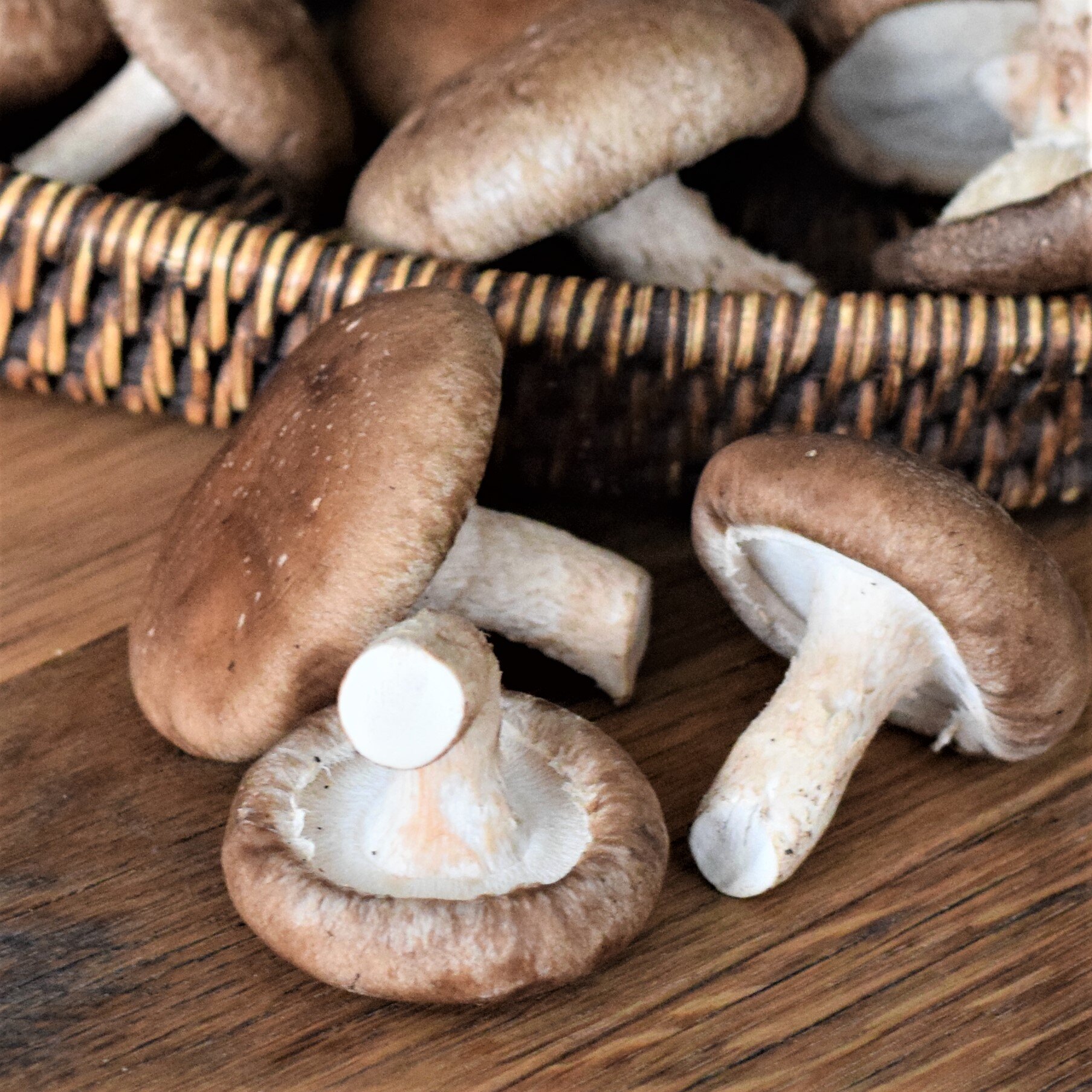Cooking with Medicinal Mushrooms: My Favorite Recipes for Shiitake and Maitake Mushrooms
As an herbalist and aspiring chef, there's not much I enjoy more than serving up a delicious meal brimming with medicinal plants. It's why I love cooking with medicinal mushrooms, especially shiitake and maitake—two easy-to-find mushrooms with a rich, savory, umami flavor. These superfood mushrooms can turn even a simple soup or risotto into a gastronomic delight.
Let's take a quick look at why these tasty fungi are such good medicine. After that, I'll share some of my favorite recipes for maitake and shiitake mushrooms.
The Health Benefits of Shiitake and Maitake Mushrooms
Shiitake and maitake mushrooms have similar nutritional value. Both are low-calorie, low-fat sources of protein and dietary fiber that make for a hearty meal. They both contain a range of B vitamins and maitake is especially rich in Vitamin D once exposed to the sun. Eating shiitake and maitake will also increase your uptake of antioxidants and trace minerals like zinc, selenium, phosphorus, and copper.
Compounds extracted from both shiitake and maitake show strong anti-tumor and immune-enhancing properties. These extracts have been used to treat cancer and for people undergoing chemotherapy. Other compounds support healthy gut flora and possess antiviral and antibacterial properties. Both mushrooms are being studied for their ability to support cardiovascular health and balance blood sugar.
While most research on medicinal mushrooms tends to be on specific compounds, there is good evidence that including shiitake and maitake in your diet comes with significant health benefits. In addition to the nutritional value, a recent study published by the Penn State College of Medicine found that eating more mushrooms was associated with lower cancer risk.
So, how do you get all this medicinal goodness on the table?
If you're a creative cook who likes to venture "off-recipe," consider substituting shiitake or maitake in any recipe that calls for button or cremini mushrooms. I regularly use roasted shiitake and maitake on pizza and salad, and in omelets and quiche. The umami flavor profile is enhanced with walnuts (I love a mushroom-walnut filling for ravioli) and savory herbs like rosemary and thyme. And for everyone else, these are my favorite mushroom recipes!
My Favorite Recipes for Shiitake and Maitake Mushrooms
Creamy Cauliflower and Celery Root Mushroom Soup
This soup by the renowned vegetarian chef, Amy Chapin is a crowd-pleaser. I like to use both shiitake and maitake in this recipe, though it calls for shiitake. Pay special attention to the way Chaplin roasts the mushrooms. They come out of the oven both crisp and tender. When I add mushrooms to a salad or pizza, I use Chaplin's roasting method. I've made this soup without the celery root when it wasn't available. It's still delicious, but add the celery root if you can find it. So, yum!
Creamy Keto Mushroom Cauliflower Risotto
You don't need to follow a Keto diet to love this recipe. I substitute shiitake and maitake for the portobello mushroom and roast them first, Amy Chaplin style (as in the recipe above). After discovering this recipe, cauliflower is my new go-to, guilt-free risotto.
Creamy-ish of Mushroom Soup
This soup is SO creamy AND it's vegan! Again, I combine shiitake and maitake and roast them instead of sautéing in oil. I sometimes substitute sesame butter (aka tahini) for the raw cashews. What can I say—I never met a recipe I didn't want to change.
My family loves all these recipes. They've learned to enjoy shiitake and maitake mushrooms and I love knowing they're getting such good medicine in their meal. I hope you enjoy these mushrooms and these recipes as much as we do.
References
Nanba H (1997). Maitake D-fraction: healing and preventive potential in cancer [Abstract]. Orthomolecular Medicine Journal, 12(1): 43-49. http://orthomolecular.org/library/jom/1997/articles/1997-v12n01-p043.shtml
Stamets, P. (2005). Notes on nutritional properties of culinary-medicinal mushrooms. International Journal of Medicinal Mushrooms. 7:109-116. https://www.academia.edu/60209127/Notes_on_Nutritional_Properties_of_Culinary_Medicinal_Mushrooms
Wu, J.-Y.; Siu, K.-C.; Geng, P. (2021). Bioactive ingredients and medicinal values of Grifola frondosa (Maitake). Foods 10(1) 95. https://doi.org/10.3390/foods10010095
Yamamoto Y, Shirono H, Kono K, Ohashi Y (1997). Immunopotentiating activity of the water-soluble lignin rich fraction prepared from LEM—the extract of the solid culture medium of Lentinus edodes mycelia, Bioscience, Biotechnology, and Biochemistry, 61(11): 1909–1912. https://doi.org/10.1271/bbb.61.1909


